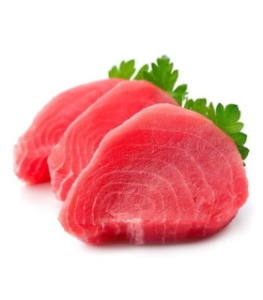Did you know: What are key nutritional components per 100 grams of cooked tuna?
MEKSEA.COM – Tuna is a highly nutritious fish, rich in protein, vitamins, minerals, and healthy fats like omega-3 fatty acids. Here’s a breakdown of the key nutritional components per 100 grams of cooked tuna:
Quick view
1. Macronutrients:
 – Calories: ~130-150 kcal
– Calories: ~130-150 kcal
– Protein: ~24-30 grams
Tuna is an excellent source of high-quality, lean protein, making it ideal for muscle repair and growth.
– Fat: ~1-5 grams (depending on the type of tuna)
– Omega-3 fatty acids: ~0.2-1.5 grams
These are essential for heart health, reducing inflammation, and supporting brain function.
– Carbohydrates: 0 grams
Tuna is a carb-free food, making it ideal for low-carb diets like keto.
2. Vitamins:
– Vitamin B12: ~150% of the Daily Value (DV)
Essential for red blood cell formation and brain health.
– Vitamin B6: ~45% of the DV
It is important for protein metabolism and neurotransmitter production.
– Niacin (Vitamin B3): ~50% of the DV
Supports energy production and cholesterol regulation.
– Vitamin D: ~20% of the DV (especially in fatty tuna)
It helps in calcium absorption, supports bone health, and boosts immune function.
3. Minerals:
– Selenium: ~60-70% of the DV
An antioxidant that helps protect cells from damage and supports immune function.
– Phosphorus: ~30% of the DV
Important for bone health and energy production.
– Magnesium: ~10-15% of the DV
Supports muscle function and nerve signaling.
– Potassium: ~10% of the DV
It helps regulate blood pressure and fluid balance.
 4. Other Nutritional Components:
4. Other Nutritional Components:
– Cholesterol: ~40-50 mg
While tuna contains cholesterol, its omega-3 content helps balance cholesterol levels in the body, promoting heart health.
– Sodium: ~40-60 mg (depending on preparation)
Generally low in sodium, but canned or processed tuna may have higher sodium levels, especially when packed in brine or with added salts.
5. Omega-3 Fatty Acids:
– Eicosapentaenoic Acid (EPA) and Docosahexaenoic Acid (DHA): These are the two most important omega-3s for human health, reducing inflammation, supporting heart and brain function, and lowering the risk of chronic diseases.
6. Low in Saturated Fat:
Tuna is low in unhealthy saturated fat, which is beneficial for cardiovascular health.
7. Mercury:
While highly nutritious, some types of tuna (especially larger species like albacore or bluefin) contain mercury, so it’s important to limit consumption, particularly for pregnant women and children.
|
However, nutritional values may vary slightly depending on the type of tuna and the cooking method. Tuna is a powerhouse of nutrients, making it a great choice for a healthy, balanced diet, especially when eaten in moderation.
Meksea sends you the list of our best-selling products this week
|
→ CO Tuna saku, skinless, boneless → CO Tuna Steak, skin on, boneless → Tuna steak, skinless, boneless, bloodline off
|
→ Tuna loins Skin on, boneless, bloodline off |
Kindly please visit Meksea website to explore our tuna products:https://mekseaconnection.com/product-category/tuna/
Meksea always pays particular attention to product quality to secure each consumer’s family member’s health and set their mind at rest by bringing in true quality seafood products.
Are you looking for shrimp products for your sales plan for 2024 and 2025? Contact Meksea right now for the best offers.
By Hayati (Meksea Team)
(hayati@mekseaconnection.com)
(Collection)
If you found this topic interesting, please click the Like button below, so we may continue to expand this topic. Leave a comment with your thoughts for the author team to discuss

 Nutritional Summary (100g of Cooked Tuna):
Nutritional Summary (100g of Cooked Tuna):